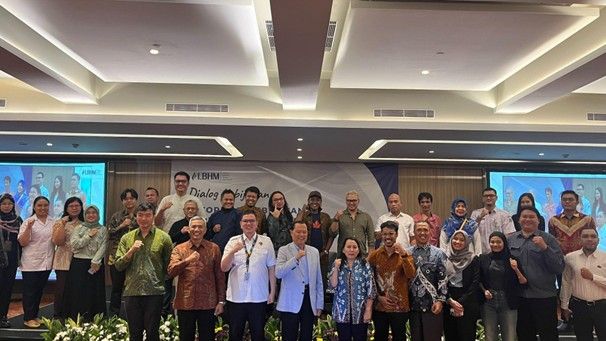Indonesia’s drug policy at a crossroads: A shift towards rights-based reform?
As Indonesia entered a new political era in 2024 with President Prabowo Subianto, big questions have been triggered about the future direction of our country’s drug policy. Civil society, including LBH Masyarakat (LBHM), is urging a shift away from punitive approaches toward evidence-based approaches rooted in health and human rights principles.
A National Policy Dialogue Grounded in Human Rights
On 4 December 2024, LBHM organized a national Policy Dialogue on Drug Policy Reform and Harm Reduction in Jakarta, Indonesia. The event brought together over 100 participants from government institutions, civil society, and legal and harm reduction practitioners, both in-person and online, to discuss the 2025 priority agenda: revising the Narcotics Law.
The keynote speech by Deputy Minister of Law and Human Rights, Edward Omar Sharif Hiariej, set the tone for discussions. Reflecting on his decades-long stance that people who use drugs should be offered treatment rather than met with punishment, he stated:
“Even in my undergraduate thesis 28 years ago, I recommended that people who use drugs be treated, not punished.”
Representatives from Parliament, the Supreme Court, and Indonesia’s National Narcotics Board (BNN) all emphasized the inadequacies of the current drug law. One of the most pressing issues highlighted is the urgent need to expand access to treatment and rehabilitation services without imposing criminal penalties on people who use drugs. This approach is not just a matter of compassion, it is a necessary step toward a more effective and humane drug policy. Currently, our drug policies rely heavily on punitive measures. However, this approach falls short in one critical area: its failure to distinguish between people who use drugs, dealers, and traffickers. Judge Sutarjo of the Supreme Court critiqued this, noting:
“There are no clear parameters for people who use drugs versus a dealer. This blurs justice and fairness in sentencing.”
While in reality, there is not always a clear distinction to be made between drug use, dealing and trafficking, e.g. people who use drugs may also engage in dealing to support their drug use, civil society voices, like those from the Narcotics Policy Reform Network (JRKN), stated that all elements of society need to collectively push for and monitor the revision process of the Narcotics Law to ensure it can result in better health and human rights outcomes for communities. Another perspective came from Suar Perempuan Lingkar Napza Nusantara (SPINN), a women-led community group, which called attention to structural discrimination, especially against women and people with diverse gender identities. A lack of gender-sensitive harm reduction policies, they warned, results in heightened fear, stigma, and criminalisation, driving vulnerable groups further away from care services when they need them.
The Ministry of Health acknowledged the limitations of the current system, noting that the UNODC has shared in their World Drug Reports that generally only 1 in 8 people who use drugs may be in need of treatment or rehabilitation. Therefore, policies should not be imposed to require all people who use drugs to undergo treatment programmes. Meanwhile, the Ministry of Social Affairs pledged to improve and ensure the standardisation of rehabilitation centres, recognising the harms caused by unregulated private rehabilitation centres.
The policy dialogue concluded with a strong call for revisions to the Narcotics Law that centres public health, human rights, and inclusive policies for all.
Re-examining Kratom: Criminalisation or Cultural Commodity?
While legal reform is one priority for Indonesia, another critical issue where debate is emerging around is on kratom (mitragyna speciosa), a plant native to West Kalimantan and used traditionally for medicinal, economic, and cultural purposes. LBHM is currently studying the regulation of kratom, as well as its cultivation and use, to prepare a policy paper that aims to produce recommendations relevant to national and local policies and which incorporate perspectives from affected communities.
Kratom’s regulatory status in Indonesia remains contradictory. On one hand, the National Agency of Drug and Food Control (BPOM) prohibits the use of kratom in traditional medicines and health supplements¹. In 2022, BNN sided with this position, pushing for kratom’s classification as a Schedule I narcotic and effectively banning its use². On the other hand, the Ministry of Trade’s 2024 regulation recognises its economic value by allowing exports under specific conditions³.
LBHM’s upcoming policy paper dives into this paradox. It seeks to document the lived experiences of indigenous communities in West Kalimantan, where kratom has been used for generations to treat ailments like pain, fever, and diarrhoea, and to support livelihoods⁴. The policy paper will ask:
- How do existing and proposed kratom policies impact indigenous communities?
- Can governance models better reflect cultural, health, and environmental dimensions, rather than reduce kratom to a binary of "illegal drug" vs "commodity"?
Importantly, the policy paper will propose an alternative governance framework that honours and positions indigenous knowledge at the centre of kratom regulation.
What Comes Next?
At the end of June, the momentum for reform will continue through broader civil society mobilization and engagement in drug policy discussions. AKSI Keadilan is preparing to convene a national policy forum, similar to the policy dialogue that LBHM held in December 2024, but this time with a creative and cultural focus that explores how drug policy intersects with artistic and cultural practices in the everyday life of communities. Watch this space to see how it turns out!
-
Notes
¹ BPOM Circular Letter Number HK.04.4.42.421.09.16.1740 of 2016
² Andilala, BNN: Kratom will be totally banned from 2022, Antara News (2019), diakses melalui https://www.antaranews.com/berita/1147832/bnn-kratom-dilarang-total-mulai-2022#google_vignette
³ Minister of Trade Regulation Number 21 of 2024 concerning the Second Amendment to Minister of Trade Regulation Number 23 of 2023 on Export Policy and Regulation.
⁴ Ratna Herawatiningsih, et.al., Etnobotany of Kratom Plants by Society Around The Labian DAS In Labian Ira’ang Village, Batang Lupaar Sub-District, Kapuas Hulu Regency, Jurnal Hutan Lestari (2024) Vol. 12 (1): 165-176, diakses melalui: https://jurnal.untan.ac.id/index.php/jmfkh/article/viewFile/72344/75676602069

